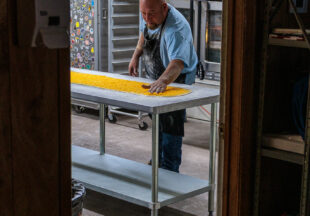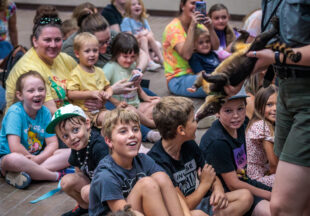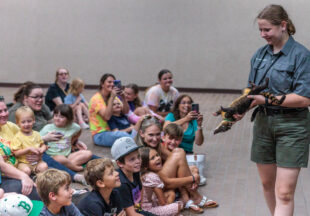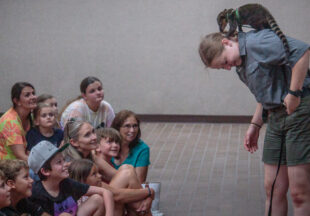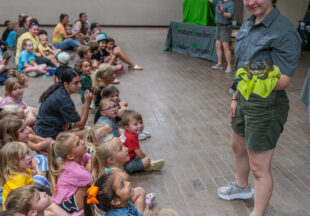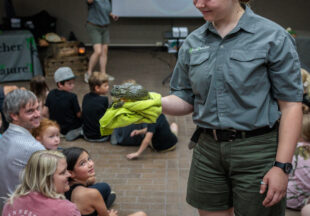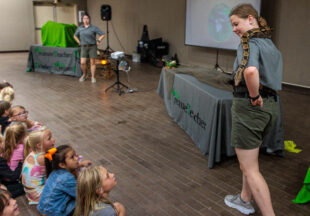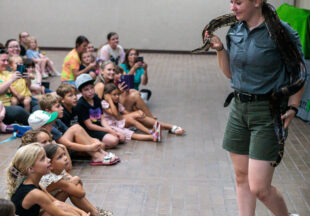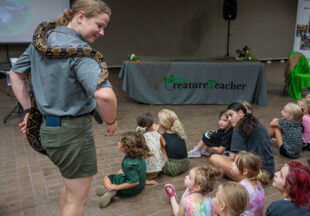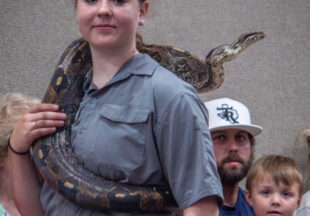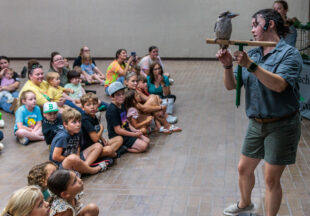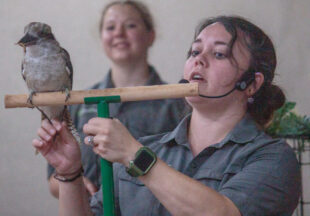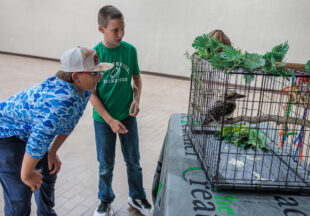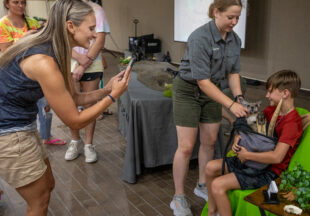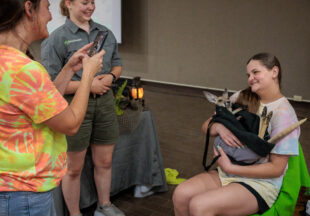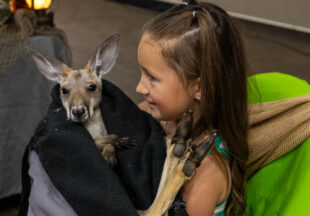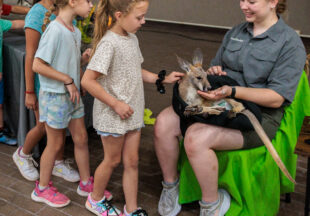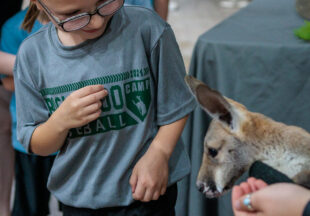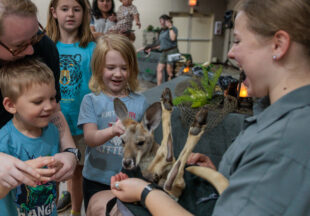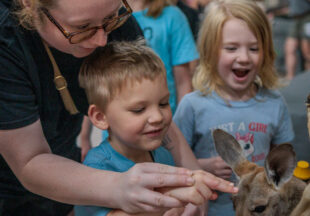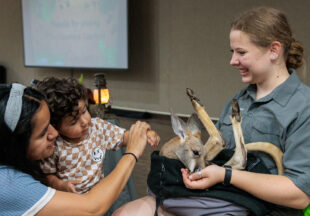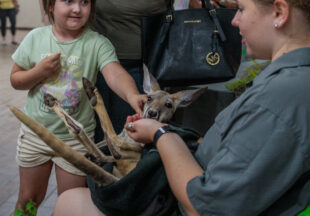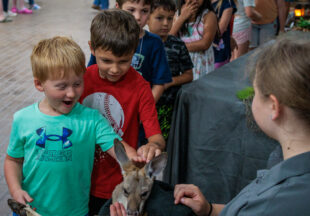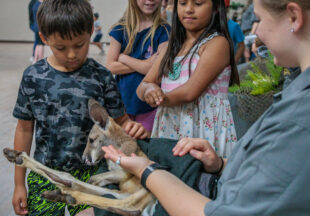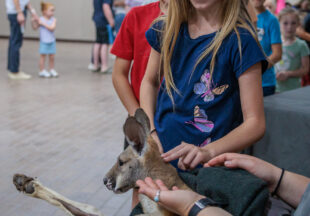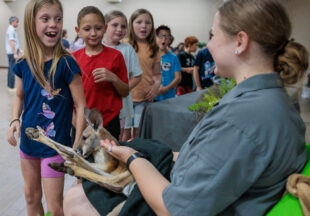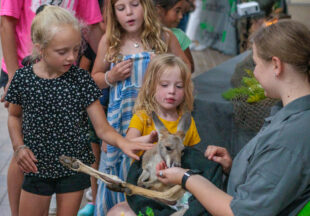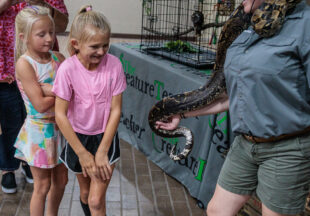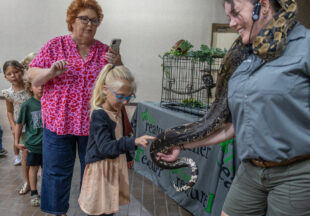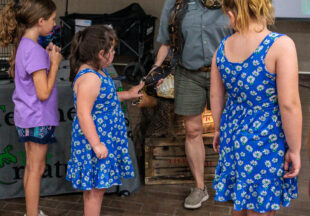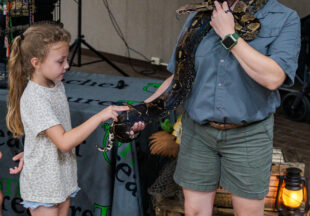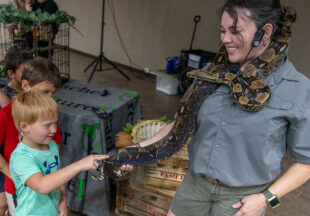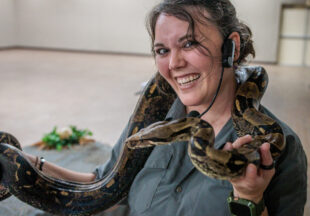Get ready…get set…goat! Herd for hire helps clear brush on banks of Walker Branch

By Carla McKeown/Breckenridge Texan
There’s Scarlet and Sebastian and Atlas and Orion.
There’s Decker and Pongo and Gizmo and Roman.
And, we can’t forget Freckles. “She’s a good mama,” says Terry Carr, scratching the speckled goat behind the ears.

Terry Carr with Rent-a-Ruminant talks to his herd Friday morning as he prepared to move them across the street to a new grazing section. Click here to see more goat photos. (Photo by Tony Pilkington/Breckenridge Texan)
Carr and the 150 goats he looks after are from the Texas franchise of Rent-a-Ruminant, a herd-for-hire business that is clearing out the brush along Walker Branch, the creek that runs through the west side of Breckenridge. They were hired by the City of Breckenridge, which realized they could save several thousand dollars by hiring the goat herd rather than contracting with a mowing company.
The City of Breckenridge wants the area around the creek cleaned out to try and prevent some of the localized flooding that happens during times of heavy rain. But, other areas of the country are also using goats for fire prevention, according to a Saturday article in the New York Times.
That story focuses on Lani Malmburg and her herd of 200 goats that not only eat unwanted brush but also help encourage the growth of more desirable native grasses that will help prevent future wildfires. “After the goats digest the brush, their waste returns organic matter to the soil, increasing its potential to hold water. Goats are browsers that eat the grass, leaves and tall brush that cows and other grazers can’t reach. This type of vegetation is known as the fire fuel ladder and leads to wider spread when wildfires spark,” the story says.
Here in Breckenridge, Carr and his herd arrived a couple of weeks ago and have cleared about seven blocks of overgrown brush on the banks of the creek. In the areas that have a lot of river cane and cattails, some of the woodier growth is left behind. Carr said the City has a crew coming in behind them to cut down some of the river cane that the goats won’t eat.
“The cattails and the giant reeds (aka river cane) is an acquired taste. It’s like spinach to them – they’ll nibble on it, but they won’t eat a lot of it. They prefer the other leaves and grass and brush,” he said, adding that some of the smaller goats have a hard time getting the tough river cane knocked down.

Kyle Carr, left, sets up a temporary fence across North Liveoak Street on Friday. Carr and his dad, Terry Carr, background, hire out the goats to clear brush from hard-to-mow areas. (Photo by Tony Pilkington/Breckenridge Texan)
The Rent-a-Ruminant franchise is owned by Carr’s son and daughter-in-law, Kyle and Carolyn Carr, who live in the Brownwood area. They own 261 goats.
The couple started the business about five years ago, starting the first Rent-a-Ruminant franchise of the parent company based just outside of Seattle, Washington. The company’s founder, Tammy Dunakin, trained the Carrs, who bought their first goats from Kyle’s sister. Over the years, they’ve added to the herd, mostly through breeding and rescues.
The goats are treated like family, said Terry, who lives in Rising Star. The 150 goats that travel around Texas clearing brush include does (females) and wethers (castrated males) of varying ages.
Back on the ranch are the mama goats and their kids, bucks (breeding males), and the retired goats that are too old to travel.
It sounds like a euphemistic tale parents tell young children about a beloved pet, but the Rent-a-Ruminant Texas goats really do live out their golden years on a retirement pasture, eating grass that’s easier on their old teeth. When they get too old for that, they’re moved to an enclosed area with the nanny goats and kids, enjoying goat feed. Once they die, they are buried in a plot on the ranch, Terry said.
It was that “like family” treatment that led to the Carrs traveling to Florida to rescue dozens of goats that had been left homeless in 2018 after category-5 Hurricane Michael struck the state’s panhandle area, Kyle said. A distant relative lives in the area and put the Texas family in touch with the Alaqua Animal Rescue organization, which had been caring for the wayward animals, along with homeless dogs, cats, horses and other animals displaced by the storm.
Additionally, the Texas franchise sometimes takes in goats that are donated to them by FFA students who raised a goat for a livestock show project and don’t want to sell it.

Rio enjoys some of the fresh greenery after the herd moved to a new section Friday afternoon. (Photo by Tony Pilkington/ Breckenridge Texan)
All of the goats have names. Kyle said Carolyn names each goat, basing the name on the individual’s personality. To help keep up with which goat is which in a sea of 261 goats, the names are written on each goat’s ear tag.
In fact, the entire operation was Carolyn’s idea, Kyle said. They needed to get rid of some brush on their property, and she suggested renting some goats. When they realized there weren’t any herds for hire nearby, she then suggested that they get some goats and offer the service themselves.
Five years later, they have a thriving franchise with enough business to keep the traveling herd busy continuously. Terry said they’re considering creating a second traveling herd so that they can provide the brush control service to two locations at one time.
When the young goats are about a year or two old, depending on the specific goat, they are merged into the travel herd. The Carrs don’t let the younger kids travel because they might get injured in the trailer. Additionally, the older goats sometimes challenge the newcomers to the travel herd with head butts, and the kids might get hurt.
“Some people think they’re fighting, but mainly it’s communication and playing,” Terry said. “Sometimes, it’s pecking order…about who’s going to be the leader of the pack. But, mainly it’s playing.”
The goats tend to be clannish, Terry said, sticking together in family groups, especially at night.
“They’re very affectionate, very intelligent, very family oriented,” he said. “At night, they’ll find their mamas and grandmothers, and they’ll go lay down to sleep side-by-side. The whole herd stays together at night, which is good.”
When a city or other organization hires the Carrs’ operation to clear brush, the project includes setting up electric fencing around each area where the goats will be grazing. As each area is grazed down, the goats are moved to the next section.
In Breckenridge, the sections are basically organized by city blocks. The project started where Walker Branch intersects with West Walker Street, near North Oakwood Street, and will continue to where the creek intersects with North Breckenridge Avenue.

As soon as Kyle, left, opened up the fence and Terry, right, called “C’mon goatie, goatie!” the herd rushed across the street. (Photo by Tony Pilkington/Breckenridge Texan)
On Friday morning, Sept. 18, the herd was near on the southwest corner of West Dyer and North Liveoak streets. They had eaten all of the leafy brush in that block and were tired of the woody river cane. A few of the larger goats were jumping up onto the cane to knock it down so they could get to the greener leaves.
The herd was getting restless and a little noisy. A couple of the goats are self-appointed spokesgoats for the herd and start bleating first, Terry said, and before long the entire group is complaining about the current conditions.
At about noon Friday, Terry and Kyle blocked off the intersection, letting the Breckenridge Police Department know that they were about to move the goats across the street. With a temporary fence strung across Liveoak, they opened up entryways in both sections.
As Terry called, “C’mon goatie, goatie, c’mon,” the herd eagerly crossed the roadway. In less than a minute, all 150 goats were in the new section across the parking lot from the Stephens County Humane Society’s thrift shop. Some of the goats stopped at the first sprig of fresh greens they came upon, while others rushed to the other end of the block near North Smith Street.
Quickly, Terry and Kyle disassembled the road block and alerted the BPD that the streets were opened back up.
The electric fencing is used more to keep predators away from the goats than it is to keep the goats enclosed, Terry said. The goats are trained early in life to stay within the confines of the fence, and they respect the boundaries. In the five years they’ve been doing this, they’ve never had one goat get out, he said.
However, they have seen pictures indicating that the electric fencing has deterred some animals, including dogs, coyotes and bobcats from getting in with the goats. Additionally, the fence discourages humans from entering the goat area.
As part of their agreement with each organization hiring the herd, someone from Rent-a-Ruminant is with the goats at all times.
Kyle said they hope to be finished with the Breckenridge project by Saturday. They’re scheduled for a job in Coleman next, and then the herd will head down to Houston to work.
The Texas Rent-a-Ruminant franchise is already booking jobs in 2022.
But, for now, they’re still working on clearing the brush on the banks of Walker Branch. By Sunday afternoon, they had eaten up most of their favorite brush in the new section and were gathering on the east end of the block, ready to move on to green pastures – or at least a brushier patch of creek bed.
To see more photos from the Rent-a-Ruminant activities on Walker Branch, click here for the Breckenridge Texan’s Photo Gallery.

The goats didn’t waste any time getting to work eating the weeds growing in the section of the creek bed that they moved to Friday afternoon. (Photo by Tony Pilkington/Breckenridge Texan)
Cutline, top photo: After they’ve eaten all of the soft, brushy weeds in an area, the goats in the Rent-a-Ruminant Texas herd are ready to move on to fresher grass. They’ll eat some of the river cane and cattails, but those aren’t their favorites. (Photo by Tony Pilkington/Breckenridge Texan)
Make sure you don’t miss any of the Breckenridge Texan’s news…click here to sign up for our email newsletter, the Weekly News Roundup. It has links to stories, photo galleries and more! It’s free to sign up, and it comes to you on Monday mornings (Tuesdays, after a holiday).














